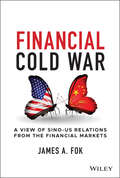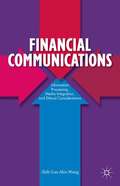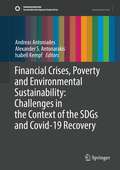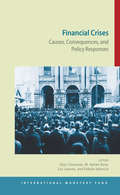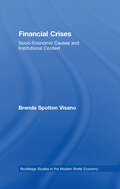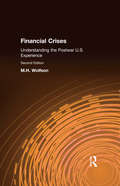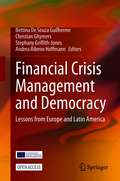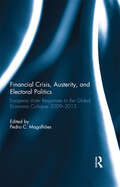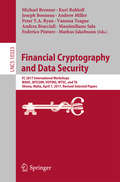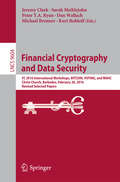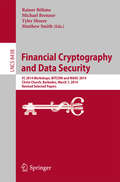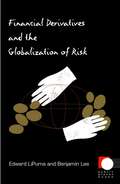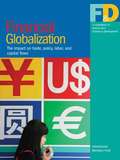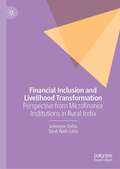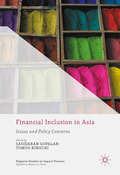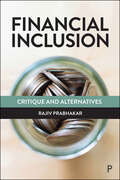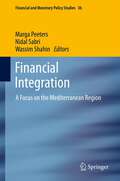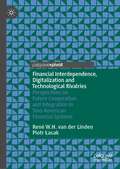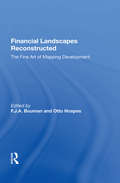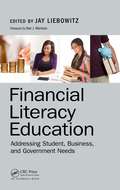- Table View
- List View
Financial Cold War: A View of Sino-US Relations from the Financial Markets
by James A. FokA groundbreaking exploration of US-China relations as seen through the lens of international finance Rising tensions between China and the United States have kept the financial markets on edge as a showdown between the world’s two largest economies seems inevitable. But what most people fail to recognise is the major impact that the financial markets themselves have had on the creation and acceleration of the conflict. In Financial Cold War: A View of Sino-US Relations from the Financial Markets, market structure and geopolitical finance expert James Fok explores the nuances of China-US relations from the perspective of the financial markets. The book helps readers understand how imbalances in the structure of global financial markets have singularly contributed to frictions between the two countries. In this book, readers will find: A comprehensive examination of the development of financial markets in both China and the US, as well as the current US dollar-based global financial system Insightful observations of the roles of technology, innovation, regulation, taxation, and politics in the markets, and on their resulting effect on US-Sino relations Thorough explorations of the role of Hong Kong as an intermediary for capital flows between China and the rest of the world Suggestions for how, balancing the many varying interests, policymakers might be able to devise effective strategies for de-escalating current Sino-US tensions Financial Cold War is a can’t-miss resource for anyone personally or professionally interested in the intersection of economics and international relations, financial markets, and the infrastructure underlying the international financial system.
Financial Communications
by Shih-lun Alex WangFinancial Communications showcases why it is crucial for financial institutions to enhance key communication processes, rebuild trust with its customer base, improve relationships, and derive better brand awareness amongst key stakeholders within the industry.
Financial Counseling
by Dorothy B. Durband Ryan H. Law Angela K. Mazzolini"This text is a valuable new resource that we recommend for all of our professionals and are proud to incorporate as part of our AFC® certification program. With expertise representing the breadth and depth of the financial counseling profession, the content in this text provides you with a rigorous foundation of knowledge, considers critical theoretical models, and explores foundational skills of communication, self-awareness, and bias. This type of comprehensive approach aligns with our mission and vision—providing you with the foundational knowledge to meet clients where they are across the financial life-cycle and impact long-term financial capability." -Rebecca Wiggins, Executive Director, AFCPE® (Association for Financial Counseling and Planning Education®)This timely volume presents a comprehensive overview of financial counseling skills in accessible, practical detail for readers throughout the career span. Expert financial counselors, educators, and researchers refer to classic and current theories for up-to-date instruction on building long-term client competence, working with clients of diverse backgrounds, addressing problem financial behavior, and approaching sensitive topics. From these core components, readers have a choice of integrated frameworks for guiding clients in critical areas of financial decision-making. This essential work: · Offers an introduction to financial counseling as a practice and profession · Discusses the challenges of working in financial counseling · Explores the elements of the client/counselor relationship · Compares delivery systems and practice models · Features effective tools and resources used in financial counseling · Encourages counselor ethics, preparedness, and self-awareness A standout in professional development references, Financial Counseling equips students and new professionals to better understand this demanding field, and offers seasoned veterans a robust refresher course in current best practices.
Financial Crises, Poverty and Environmental Sustainability: Challenges in the Context of the SDGs and Covid-19 Recovery (Sustainable Development Goals Series)
by Andreas Antoniades Alexander S. Antonarakis Isabell KempfThis volume advances the state-of-the-art in the study of the interplay among financial crises, poverty dynamics and environmental sustainability. It offers timely and unique contributions to the immediate global challenge of sustainable development. Developing a new evidence-base, the volume offers concrete recommendations for policy action needed in advancing the Sustainable Development Goals (SDGs) in relation to environment and poverty during the current conditions of financial distress. The approach taken is inductive and evidence-driven. Most analysis is based on in-depth case studies that aim to offer a detailed and dynamic picture on how poverty and environmental sustainability interact in specific social contexts and financial crises. In this way the volume aims to generate a wealth of new and concrete evidence that offer a solid foundation to understand the multiple channels through which social and environmental factors interact, and the ways in which this interaction can and should be managed in order to achieve the needed global transition to sustainability. Broader dynamics that are covered and analysed include the historical legacies of structural adjustment and colonialism; the current debt wave experienced in developing countries; the role of inequality; the significant impact that climate change has on livelihoods and on meeting the SDGs; the new challenge presented by the Covid-19 pandemic for the SDGs; the challenge of sustainable funding for SDGs; and the need for a new eco-social contract. Case-studies examined include Cambodia, Ethiopia, India, Indonesia, Zambia, and subregions such as the Caribbean, sub-Saharan Africa and Lower Mekong Countries. The volume is part of a joint initiative by the ‘Sussex Sustainability Research Programme (SSRP)’ of the University of Sussex, the ‘UNDP-UNEP Poverty-Environment Action for Sustainable Development Goals’ and the ‘United Nations Research Institute for Social Development (UNRISD)’. The overall aim is to advance a new research programme and foster a better understanding of the multiple, complex and often opposing ways through which the punctuated economic slowdown of financial crises, poverty dynamics and environmental sustainability interact. It also makes novel recommendations into how poverty reduction and environment can work in synergy rather than being antagonistic, especially during financial distress, leading into recommendations directly geared towards achieving the SDGs and beyond.
Financial Crises: Causes, Consequences, and Policy Responses
by M. Ayhan Kose Stijn Claessens Luc Laeven Fabián ValenciaA report from the International Monetary Fund.
Financial Crises: Socio-Economic Causes and Institutional Context (Routledge Studies in the Modern World Economy)
by Brenda Spotton VisanoThis study explores the major patterns of change in the evolution of financial crises as enduring phenomena and analyzes the paradoxical position that crises are at once similar to and different from each other. Brenda Spotton-Visano examines economic, psychological and social elements intrinsic to the process of capitalist accumulation and innovation to explain the enduring similarities of crises across historical episodes. She also assesses the impact that changing financial and economic structures have on determining the specific nature of crises and the differential effect these have in focal point, manner and extent of transmission to other, otherwise unrelated, parts of the economy. Financial Crises offers a consistent method for interpreting variations in financial crises through time and allows for a better overall appreciation for both the transitory fragility and enduring flexibility of financial capitalism and the potential vulnerability created by on-going financial development. Topical and informative, this key book is of keen interest to all those studying and researching international economics and political economy.
Financial Crises: Understanding the Postwar U.S. Experience
by M.H. WolfsonThis book is a survey and critique of the major theories of financial crises. The first edition built a model of crisis from an analysis of postwar financial crises in the US through the mid-1980s. The second edition continues the story from 1985 and covers the stock market crash of 1987, the collapse of the Savings and Loan industry, the severe problems of US commercial banks, and the increasing risks posed by junk bonds. A new chapter analyses the causes of increasing financial instability in the 1980s. The book's extensive charts and tables are fully revised and updated to present the latest evidence. The first edition has gained wide interest as a supplemental text.
Financial Crisis Management and Democracy: Lessons from Europe and Latin America
by Stephany Griffith-Jones Andrea Ribeiro Hoffmann Bettina De Souza Guilherme Christian GhymersThis open access book discusses financial crisis management and policy in Europe and Latin America, with a special focus on equity and democracy. Based on a three-year research project by the Jean Monnet Network, this volume takes an interdisciplinary, comparative approach, analyzing both the role and impact of the EU and regional organizations in Latin America on crisis management as well as the consequences of crisis on the process of European integration and on Latin America’s regionalism.The book begins with a theoretical introduction, exploring the effects of the paradigm change on economic policies in Europe and in Latin America and analyzing key systemic aspects of the unsustainability of the present economic system explaining the global crises and their interconnections. The following chapters are divided into sections. The second section explores aspects of regional governance and how the economic and financial crises were managed on a macro level in Europe and Latin America. The third and fourth sections use case studies to drill down to the impact of the crises at the national and regional levels, including the emergence of political polarization and rise in populism in both areas. The last section presents proposals for reform, including the transition from finance capitalism to a sustainable real capitalism in both regions and at the inter-regional level of EU-LAC relations.Written by an international network of academics, practitioners and policy advisors, this volume will be of interest to researchers and students interested in macroeconomics, comparative regionalism, democracy, and financial crisis management as well as politicians, policy advisors, and members of national and regional organizations in the EU and Latin America.
Financial Crisis, Austerity, and Electoral Politics: European Voter Responses to the Global Economic Collapse 2009-2013
by Pedro C. MagalhãesThis book examines the domestic electoral consequences of the economic and financial crisis in Europe, particularly in those countries where the crisis manifested itself more devastatingly: the Southern European countries of Greece, Italy, Portugal, and Spain, as well as Iceland and Ireland. On the surface, the electoral consequences of the crisis seem largely similar, having resulted, in these countries, in large electoral losses for incumbents, as the most elementary versions of "economic voting" theory would have us expect. However, behind this fundamental similarity, important differences emerge. Whilst in some cases, on the basis of post-election surveys, it is possible to see that the "crisis elections" followed a previous pattern of performance-oriented voters, with no major changes either in known predictors of electoral choices or in basic party system properties, other elections brought the emergence of new parties, new issues and cleavages, altering patterns of political competition. By examining these different outcomes by comparing the "crisis elections" with previous ones, this book takes into account their timing relative to different stages of crisis. It also scrutinises party strategies and campaign dynamics, particularly as governments attempted (and sometimes succeeded) in framing events and proposals so as to apportion responsibility for economic outcomes. This book was originally published as a special issue of the Journal of Elections, Public Opinion and Parties.
Financial Cryptography and Data Security
by Michael Brenner Andrew Miller Markus Jakobsson Joseph Bonneau Kurt Rohloff Vanessa Teague Peter Y.A. Ryan Andrea Bracciali Massimiliano Sala Federico PintoreThis book constitutes the thoroughly refereed post-conference proceedings of the workshop on Usable Security, USEC 2013, and the third Workshop on Applied Homomorphic Cryptography, WAHC 2013, held in conjunction with the 17th International Conference on Financial Cryptology and Data Security, FC 2013, in Okinawa, Japan. The 16 revised full papers presented were carefully selected from numerous submissions and cover all aspects of data security. The goal of the USEC workshop was to engage on all aspects of human factors and usability in the context of security. The goal of the WAHC workshop was to bring together professionals, researchers and practitioners in the area of computer security and applied cryptography with an interest in practical applications of homomorphic encryption, secure function evaluation, private information retrieval or searchable encryption to present, discuss, and share the latest findings in the field, and to exchange ideas that address real-world problems with practical solutions using homomorphic cryptography.
Financial Cryptography and Data Security
by Michael Brenner Kurt Rohloff Jeremy Clark Sarah Meiklejohn Peter Y.A. Ryan Dan WallachThis book constitutes the thoroughly refereed post-conference proceedings of the workshop on Usable Security, USEC 2013, and the third Workshop on Applied Homomorphic Cryptography, WAHC 2013, held in conjunction with the 17th International Conference on Financial Cryptology and Data Security, FC 2013, in Okinawa, Japan. The 16 revised full papers presented were carefully selected from numerous submissions and cover all aspects of data security. The goal of the USEC workshop was to engage on all aspects of human factors and usability in the context of security. The goal of the WAHC workshop was to bring together professionals, researchers and practitioners in the area of computer security and applied cryptography with an interest in practical applications of homomorphic encryption, secure function evaluation, private information retrieval or searchable encryption to present, discuss, and share the latest findings in the field, and to exchange ideas that address real-world problems with practical solutions using homomorphic cryptography.
Financial Cryptography and Data Security
by Michael Brenner Matthew Smith Rainer Böhme Tyler MooreThis books constitutes the thoroughly refereed papers and poster abstracts from the FC 2014 Workshops, the First Workshop on Bitcoin Research, BITCOIN 2014, and the Second Workshop on Applied Homomorphic Cryptography and Encrypted Computing, WAHC 2014, co-located with the 18th International Conference on Financial Cryptography and Data Security, held in Christ Church, Barbados, on March 7, 2014. The 15 full papers and 3 poster abstracts presented were carefully reviewed and selected from 30 submissions. They are grouped in topical sections on Bitcoin transactions, policy and legal issues; Bitcoin security; improving digital currencies; posters, and WAHC papers.
Financial Deepening in the CFA Franc Zone: The Role of Institutions
by Kangni Kpodar Dhaneshwar Ghura Raju Jan SinghA report from the International Monetary Fund.
Financial Derivatives and the Globalization of Risk
by Benjamin Lee Edward LipumaThe market for financial derivatives is far and away the largest and most powerful market in the world, and it is growing exponentially. In 1970 the yearly valuation of financial derivatives was only a few million dollars. By 1980 the sum had swollen to nearly one hundred million dollars. By 1990 it had climbed to almost one hundred billion dollars, and in 2000 it approached one hundred trillion. Created and sustained by a small number of European and American banks, corporations, and hedge funds, the derivatives market has an enormous impact on the economies of nations--particularly poorer nations--because it controls the price of money. Derivatives bought and sold by means of computer keystrokes in London and New York affect the price of food, clothing, and housing in Johannesburg, Kuala Lumpur, and Buenos Aires. Arguing that social theorists concerned with globalization must familiarize themselves with the mechanisms of a world economy based on the rapid circulation of capital, Edward LiPuma and Benjamin Lee offer a concise introduction to financial derivatives. LiPuma and Lee explain how derivatives are essentially wagers--often on the fluctuations of national currencies--based on models that aggregate and price risk. They describe how these financial instruments are changing the face of capitalism, undermining the power of nations and perpetrating a new and less visible form of domination on postcolonial societies. As they ask: How does one know about, let alone demonstrate against, an unlisted, virtual, offshore corporation that operates in an unregulated electronic space using a secret proprietary trading strategy to buy and sell arcane financial instruments? LiPuma and Lee provide a necessary look at the obscure but consequential role of financial derivatives in the global economy.
Financial Exposure: Carl Levin's Senate Investigations Into Finance And Tax Abuse
by Elise J. BeanAt a time when Congressional investigations have taken on added importance and urgency in American politics, this book offers readers a rare, insider’s portrait of the world of US Congressional oversight. It examines specific oversight investigations into multiple financial and offshore tax scandals over fifteen years, from 1999 to 2014, when Senator Levin served in a leadership role on the US Senate Permanent Subcommittee on Investigations (PSI), the Senate’s premier investigative body. Despite mounting levels of partisanship, dysfunction, and cynicism swirling through Congress during those years, this book describes how Congressional oversight investigations can be a powerful tool for uncovering facts, building bipartisan consensus, and fostering change, offering detailed case histories as proof. Grounded in fact, and written as only an insider could tell it, this book will be of interest to financial and tax practitioners, policymakers, academics, students, and the general public.
Financial Globalization: A compilation of articles from Finance & Development
by International Monetary FundA report from the International Monetary Fund.
Financial Inclusion and Livelihood Transformation: Perspective from Microfinance Institutions in Rural India
by Tarak Nath Sahu Srimoyee DattaThis book explores the role and effect of Microfinance Institutions (MFIs) with different dimensions. It is being supported with strong empirical evidence into various parameters of MFIs directed towards inclusive finance and the transformation journey of livelihoods of its beneficiaries.It also incorporates empirical evidence with the perception of both beneficiaries and non-beneficiaries. Starting its journey toward the path of comprehending how MFIs make their footprint among the excluded population in the selected areas, it incorporates the different outcomes of MFI lending like credit utilisation patterns, income generation, and employability. As financial stability helps to break out the vicious cycle of poverty, this book emphasises the self-dependent element for the beneficiaries and their households. It addresses the important issue of the female counterparts in society. It shows how the MFIs work actively to generate female empowerment from multiple dimensions among the selected communities. It addresses key issues to consider for inclusive policy formulation, especially for backward communities in the backward areas and gives a realistic scenario of the MFI activities, their interactions with the respondents, the various outcomes, and areas for further developments, etc. This book is beneficial for academicians, researchers, and policymakers.
Financial Inclusion in Asia
by Sasidaran Gopalan Tomoo KikuchiThis book brings together a set of analytical and empirical essays aimedat understanding inclusive finance in emerging markets focusing on Asia. Despite the significant policy interest in the issue of financial inclusion inthe Asian market, there is a dearth of academic literature on the topic. Thisbook fills this gap by being the first of its kind to address the relevantissues and policy concerns relating to the availability and affordability offinancial services in this rapidly emerging geopolitical area. The bookfeatures a mixture of empirical and case study oriented essays, informed bydata, literature and policy analysis that will be useful for both the academicsand the policy makers in the region interested in the subject. Countrieshighlighted in the essays assessing financial inclusivity include Indonesia,Sri Lanka and India.
Financial Inclusion: Critique and Alternatives
by Rajiv PrabhakarShould the public play a greater role within the financial system? Decisions about money are a part of our everyday lives. Supporters promote financial inclusion as a way of helping people navigate decisions about money. However, critics fear these policies promote the financialisation of the welfare state and turn citizens into consumers. Presenting a nuanced, critical analysis of financial inclusion, Rajiv Prabhakar brings together the supportive and critical literatures which have, until now, developed in parallel. Addressing key issues including the poverty premium, financial capability and housing, this essential dialogue advances crucial public, academic and policy debates and proposes alternative paths forward.
Financial Integration
by Wassim Shahin Nidal Sabri Marga PeetersThe Arab upheaval and the world's biggest financial crisis after the Great Depression were almost simultaneous in their occurrence. The Mediterranean economies now face a dual challenge of a political and financial restructuring in the light of a shaky economic pedestal on which they stand. In light of this socio-political and economic shift in both inland and in world markets, this book offers a thorough analysis on problems, prospects and the way ahead for the financial integration of the South-Mediterranean region. Several perspectives on financial integration and policy recommendations are put forward from a leading group of researchers specializing on the Mediterranean region.
Financial Integration and Risk-Adjusted Growth Opportunities
by Iryna Ivaschenko Gianni De NicolòA report from the International Monetary Fund.
Financial Interdependence, Digitalization and Technological Rivalries: Perspectives on Future Cooperation and Integration in Sino-American Financial Systems
by Piotr Łasak René W.H. van der LindenThis Palgrave Pivot investigates how the Chinese and United States financial systems are becoming increasingly interdependent, in spite of a simultaneous technological rivalry and ‘decoupling’ between the two nations. The book offers a comparative analysis of Sino-US financial systems before and after the global financial crisis of 2008-2009, demonstrating the deepening integration of China into global financial markets and its move from an indirect bank-based system towards a direct market-oriented system. It discusses the economic and technological competition that has arisen between the US and China, the two largest financial centers based on financial technology, and demonstrates the differences in national interest driving processes of digitalization and FinTech applications. At the same time, the book points to ways in which a market-oriented global financial system and the rapid international growth of financial technology make future cooperation inevitable and necessary. This book places Sino-US financial relations in a broader financial-economic perspective and will be of interest to academics, consultants and students working in banking and finance, international financial markets, comparative economics, monetary theory and Chinese business studies.
Financial Intermediation, Competition, and Risk: A General Equilibrium Exposition
by Gianni De Nicolò Marcella LucchettaA report from the International Monetary Fund.
Financial Landscapes Reconstructed: The Fine Art Of Mapping Development
by F.J.A. Bouman Otto HospesThe past few decades have seen special and changing emphasis in policy frameworks of rural financial intermediation in developing countries, varying from the distribution of cheap credit via specialized farm credit institutions, to the building of linkages between banks and savings groups, to attempts to use traders or NGOs as new conduits of lending. The destructive impact of cheap credit programs on rural financial markets has been the subject of two conferences organized by the Ohio State University in the USA in 1976 and 1981, in conjunction with the Agency for International Development and the World Bank. They resulted in a collection of readings edited by J.D. Von Pischke, Dale W Adams and Gordon Donald, Rural Financial Markets in Developing Countries (Baltimore: Johns Hopkins Press 1983), followed by Undermining Rural Development With Cheap Credit, edited by Dale W Adams, Douglas H. Graham and J.D. Von Pischke (Boulder: Westview Press 1984). Acknowledging the increasing interest of researchers and policymakers in the roles and uses of informal financial intermediaries, the Ohio State University subsequently organized a Seminar in Washington, D.C., in 1989 that produced Informal Finance in LowIncome Countries, edited by Dale W Adams and Delbert A. Fitchett (Boulder: Westview Press 1992).
Financial Literacy Education: Addressing Student, Business, and Government Needs
by Jay LiebowitzToday's graduates should be grounded in the basics of personal finance and possess the skills and knowledge necessary to make informed decisions and take responsibility for their own financial well-being. Faced with an array of complex financial services and sophisticated products, many graduates lack the knowledge and skills to make rational, informed decisions on the use of their money and planning for future events, such as retirement.This book shows what you can do to improve financial literacy awareness and education. It covers the use of interactive games and tutorials, peer-to-peer mentoring, and financial literacy contests in addition to more formal education. It gives you a sample of approaches and experiences in the financial literacy arena. Divided into three parts, the book covers financial literacy education for grades K–12, college, and post-college.
